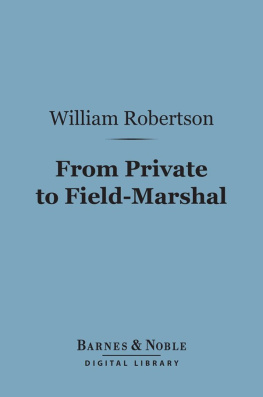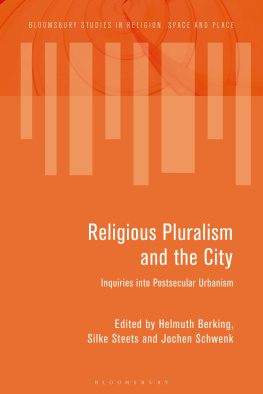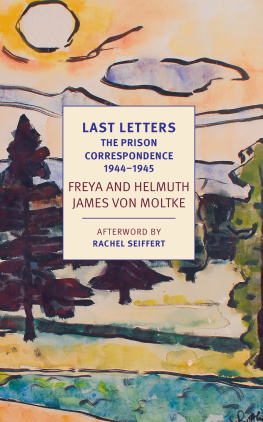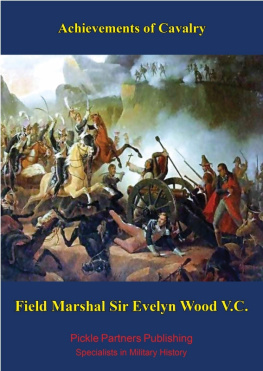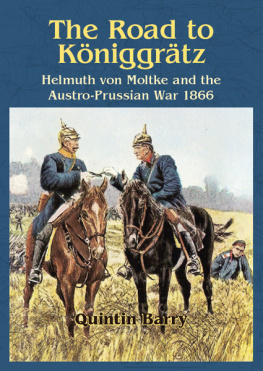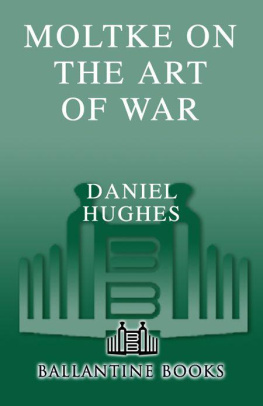
This edition is published by PICKLE PARTNERS PUBLISHINGwww.pp-publishing.com
To join our mailing list for new titles or for issues with our bookspicklepublishing@gmail.com
Or on Facebook
Text originally published in 1907 under the same title.
Pickle Partners Publishing 2016, all rights reserved. No part of this publication may be reproduced, stored in a retrieval system or transmitted by any means, electrical, mechanical or otherwise without the written permission of the copyright holder.
Publishers Note
Although in most cases we have retained the Authors original spelling and grammar to authentically reproduce the work of the Author and the original intent of such material, some additional notes and clarifications have been added for the modern readers benefit.
We have also made every effort to include all maps and illustrations of the original edition the limitations of formatting do not allow of including larger maps, we will upload as many of these maps as possible.
MOLTKES PROJECTS FOR THE CAMPAIGN OF 1866 AGAINST AUSTRIA
TRANSLATED AND PRCISED FOR THE GENERAL STAFF, WAR OFFICE,
FROM
Moltkes militrische Korrespondenz. Aus den Dienstschriften des Krieges 1866. Theil I. Kriegsvorbereitungen.
TABLE OF CONTENTS
Contents
TABLE OF CONTENTS
PREFACE
MOLTKES PROJECTS FOR THE CAMPAIGN OF 1866 AGAINST AUSTRIA. {*}
[N.B. In this paper Prussian Army Corps are denoted by Roman numerals; thus, VIII means the eight Prussian Army Corps .]
A NEW light was thrown upon the campaign of 1864 by the publication, in 1892, of Moltkes military correspondence during that wara volume which revealed, as nothing published before it had done, the brilliant abilities and resolute character of the Prussian general. That delightful volume was followed, in 1896, by the publication of a selection from Moltkes military papers relating to the war of 1866. These papers, to some extent, lift the thin veil which in the Staff history half concealed the moving springs. They are divided into four parts, collected under the headings of preparation, mobilization, and deployment, the actual operations, the truce and peace. The chief interest of these disclosures lies in the first part, for it is the arrangements for the first deployment and subsequent concentration of the Prussian Army that have formed the principal subject of controversy in regard to this campaign. Moreover, since the construction of railways, the great importance which always in every campaign has attached to the opening has been, if anything, increased. The opening is usually arranged with a deliberation impossible in the subsequent stages of the action. It is the part of the game which admits of the completest study beforehand, and it is the part in which for this campaign abundant evidence is now given. Moltkes colleagues of the Staff have told us since his death that they were much impressed by his habitual effort to think things out, and that he used in this process to assist himself by putting his thoughts on paper and rewriting his analysis or his argument again and again until he found it satisfactory. In the first part of the collection before us there are, besides a number of official letters, more than 20 of the memoranda in which Moltke cleared his mind with regard to the arrangements for the war against Austria. They enable us to trace through almost all its phases the growth of his plan of campaign.
[As early as the spring of 1860 Moltke wrote a memoir upon the deployment of the Prussian Army in case of war against Austria. It is, of course, based upon an examination of the then existing political situation, and of the condition of the Austrian and Prussian Armies at that date, when King William I was still Prince Regent, and while the Army reorganization, of which he was the author, was in process. This paper is here translated in full.]
MEMOIR NO. 1. (Translation.)
DEPLOYMENT OF THE PRUSSIAN ARMY IN A POSSIBLE WAR AGAINST AUSTRIA.
A war between Austria and Prussia would affect all the Powers of Europe; for a considerable success of the one or the other would end the present disintegrated condition of Germany, subject the small States to the victor, and found in the centre of Europe a united State, which would be equal or superior in power and influence to any of its neighbours.
Among the great Powers, England necessarily requires a strong ally upon the Continent. It would find none which would better correspond to all its interests than a united Germany, which can never claim the command of the sea, but which by a strong central position between the Romance West and the Slavonic East secures for all time the greatest imaginable stability upon the Continent. A far-seeing policy of the Cabinet of St. James would necessarily support such a transformation, and out of consideration for the ties of kindred and of religion use its influence in behalf of Prussia. Yet it is probable that England, clinging to the old order, would take the side of the party attacked in order to prevent a political remodelling of Europe, of which it must be admitted that the far-reaching consequences cannot in all their bearings be foreseen.
For direct interference in the contest, England could use only her fleet, and a weak army to be landed on the Continent. Her hostility would destroy our trade and devastate our ports, but both these forms of damage together would not suffice to endanger the existence of the State. The friendship of England, on the other hand, would protect our coasts, and might furnish the kernel for the formation of a Belgian auxiliary army. But even this limited effort of assistance becomes doubtful the moment that the interests of France are on the opposite side, because then Britain requires all her forces to protect herself.
And this case arises immediately if war breaks out between Austria and Prussia.
France least of all can wish, as the outcome of this conflict, for an Empire of the German nation, comprising 70,000,000 inhabitants, but from the conflict itself may hope for the very greatest advantagesthe acquisition of Belgium, of the Rhenish Province, and perhaps of Holland; indeed, these advantages may be looked for almost with certainty if Prussias principal forces are held fast upon the Elbe and Oder. Moreover, inasmuch as Prussia only, and not Austria, defends those Rhinelands, an alliance with Prussia could have no direct object for France. It would better correspond to the Austrian interest to sacrifice territory in the German West if thereby in the East the Austrian dynastic power can be fixed upon lasting foundations.
These same reasons would, without doubt, suffice to induce Russia to take Prussias side. However much Russia may desire extension along the southern coast of the Baltic, her main interests are towards the East. The uninterrupted internal decay of the Ottoman Empire offers there, between the fairest seas, the richest lands, whose inhabitants of kindred race and faith have been awaiting for centuries the entry of the blonde nation into Byzantium, to raise once more the Grecian cross upon the dome of St. Sophia. The realization of the plans formed even in her day by the great Empress Catherine could be prevented in the long run by none of the Maritime Powers, but only by Austria. Accordingly, nothing is so contrary to the interests of Russia as a considerable extension of the Austrian power.




